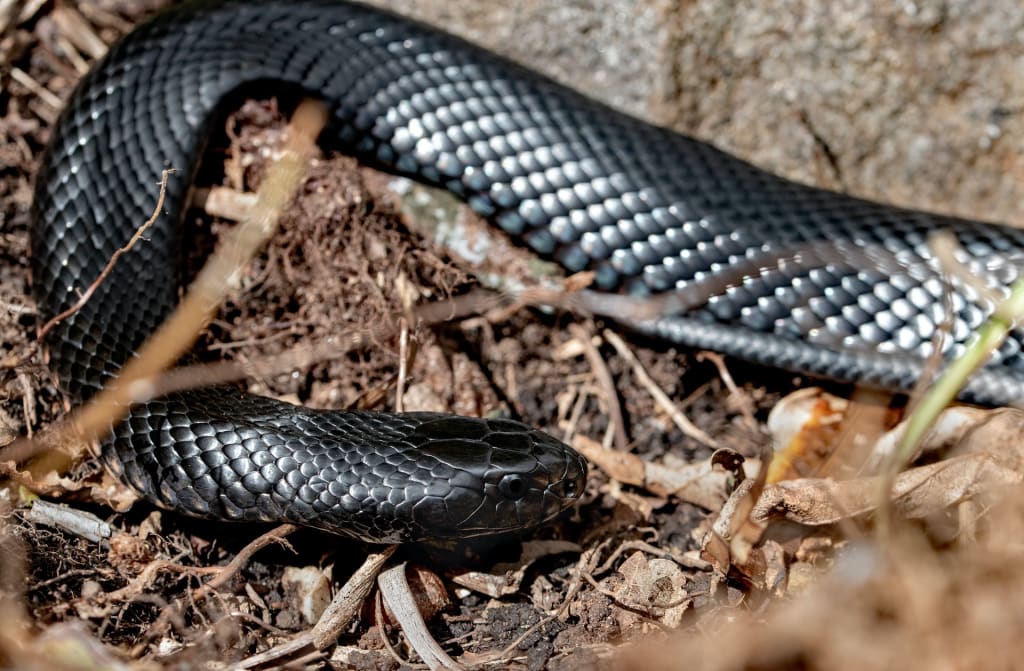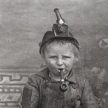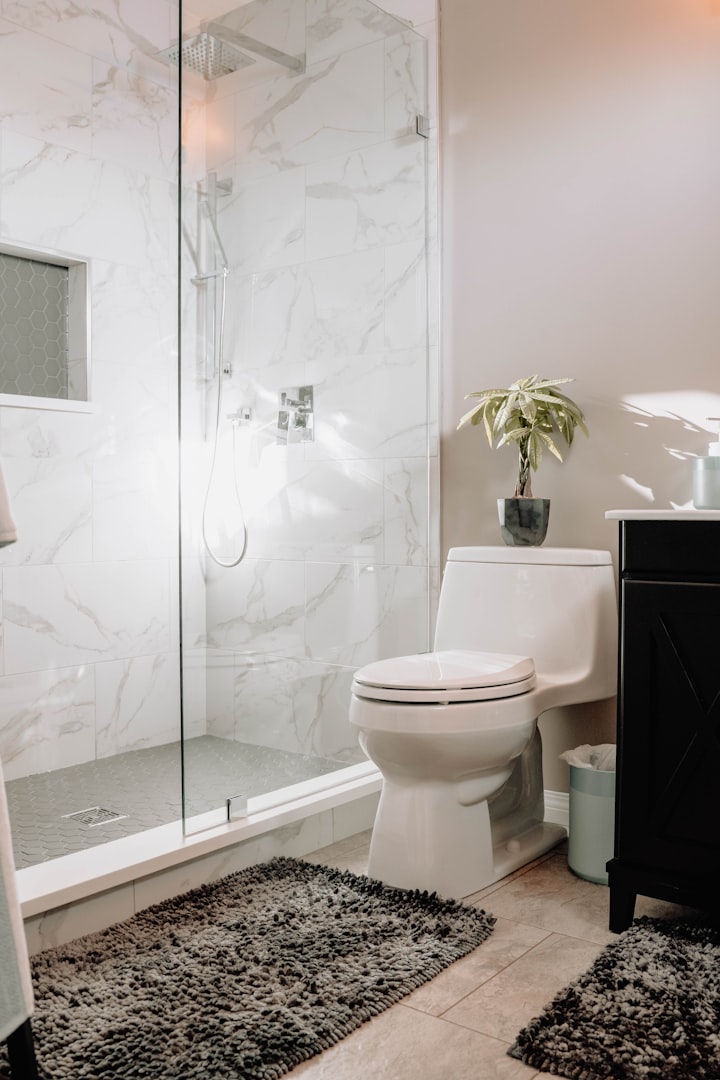Snake on A Fence- a Short Story
And rain on a sunny day

Behind my Aunt Eloise’s house was an old barn that we were supposed to stay out of because she did not think it was safe. “There’s snakes and rats in hiding in the dark,” she’d say, “and those mud dauber wasps have a nasty sting; you need to stay well away from them. Plus, that wood’s all rotted, too, so the whole thing’s liable to fall right down on top of your head.”
Of course, I just wanted to see what the inside looked like; I pictured it dark and mysterious, something like what I saw in an old, black and white Frankenstein movie where the monster hid in the barn and the farmer slipped in with nothing but the moon for light. Of course, a torch and pitchfork were conveniently available for the farmer to kill the creature; it was a Hollywood movie, after all.
The door stuck for a moment until the rusted hinges broke loose, rust flakes dropping and then the wooden door creaked as I pulled it open enough to walk inside. I looked back towards the house but knew no one could have heard it; I guess I was a little nervous I would be caught. I did not plan on going very far inside, anyway; not because it might collapse but because I did not like spiders, which I knew would be in there, and the chance a barn snake might be up in the rafters or on the ground along the walls where it was too dark to see.
The dark, cool air inside the barn was a welcome relief compared to the bright, muggy, sun-drenched air outside. The dust stirred by opening the door floated through narrow shafts of sunlight that streamed through gaps between warped and shrunken wooden wall planks to the dry dirt floor and made the shadows even darker. The air smelled vaguely of manure and rotted hay, but I would be back out in the fresh air soon enough. After my eyes adjusted to the dark, I could make out the movement of barn swallows in their nests built high up near the peaks above the double doors. Then I noticed the bird droppings on the ground and where they streaked the walls below the nests. Black wasps, mud daubers, loudly buzzed along the walls and flew out through the brilliant gaps between the planks and broken-out knot holes in the walls. A blackberry patch grew rampant in half of the meadow around the barn and with the blackberry canes in full bloom, the wasps would feed on them for as long as the blossoms lasted.
The barn was tall enough to have a hayloft on both sides and about five feet inside the door a wooden ladder led up. I walked over and pushed against one side, saw that it was fastened tight at the top and then checked the boards used as rungs. It was built of old, rough-cut, heartwood pine and felt solid as a rock. I was tempted to climb the ladder a few steps and see what was on the loft floor, but after thinking about just what might be living up there, I decided it was not worth the risk. Against a side wall, in the shadows, I could make out what might have been a wheel for the old, red tractor my dad was using, along with some farm implements, a coil of old hemp rope and maybe even an old saddle, but the streaks of sunlight streaming through gaps made those areas between even blacker.
It was neat in there: dark, like I thought it would be, and not knowing what was in the shadows or in the lofts made it seem a little mysterious. But the air was dusty, and I could hear the tractor in the distance and birds in the trees outside, and just after I turned to leave, I was startled by a loud bang. I thought at first that it was probably my cousin, Matt. He liked to play with firecrackers and cherry bombs, but he would not do that when his mother was home, so I thought that maybe the old tractor dad was using had backfired. Then the same sound again, twice, close together like gunshots. All the barn swallows stirred then, and a few took flight, swooped and expertly angled out though some of the larger gaps in the barn walls. That was when I realized the tractor was quiet, so those sounds could have been the tractor backfiring before it cut off. Except, a tractor engine would not backfire three times, as far as I knew.
I started back to the field where dad was working. I was supposed to have stayed up there or at the house with my sisters until he finished plowing the field. It was way too hot to sit in the car in the sun, so I had gone up to Aunt Eloise's house where my sisters were, but it did not take long at all to get tired of girl-talk, so I went out back in the shade and sat on a swing for a few minutes. Then, I had decided to check out the barn.
“Roland!” My dad was calling me. “Roland! I don’t know where you are, but you need to get up here, now!”
I thought I was probably in trouble for not staying with him, so I started to jog back through the deep shade and thick, green grass under huge sycamore trees behind Aunt Eloise’s farmhouse, and then back up the dirt lane. The sunshine seemed brighter, and the air already felt a whole lot hotter than just a few hours earlier, but I thought that was because I had been in the cool, deep shade of sycamores and then had spent a few minutes in the dark barn.
Dad still sat on the tractor: but it was not running, and he had a pistol in his hand, pointed towards the ground. “Where did you go?”
“I got bored,” I said, “and it’s too hot to just stand around out here, so I went into the shade behind the house.” I was not going to tell him I went into the barn that Aunt Eloise had told us to stay away from. At least, not unless I had to.
“Why do have that?” I asked and gestured at the gun. I knew dad had shotguns for hunting and a rifle for target shooting; in fact, he insisted I would get my first shotgun, a twelve gauge for hunting, on my twelfth birthday. But I had never seen dad with a handgun.
He looked at me for a few moments before answering, then put the gun in his pocket. “For snakes,” he said. “With the woods on one side and the branch over there, I knew there was a good chance of coming across a snake in this field, maybe even a copperhead, and I wanted to be ready.”
The “branch” was what they called the wide, wet area where shallow water flowed slowly past the other side of the farmhouse and into the woods. I guess it made sense to call it the “branch” since a way back in the woods it became more of a creek, eventually joining the Black Water swamp that crossed the rear part of Aunt Eloise’s farm. As the stream wound through the woods toward the swamp, it passed a few old, broken tombstones mostly covered with dead leaves: all that was left of a family cemetery. Farther along the creek had been dammed to make a large pond just before the stream reached the swamp. The water from the pond had been directed through a narrow pipe into a square, concrete “room” where it powered a belt-driven saw for cutting trees into lumber and then planks. Aunt Eloise’s farmhouse and the barn behind it were built from the heart pine of trees cut and sawn on the property. The pond was still there, but lower now and starting to fill in; the dam had broken years before and was never repaired. The thick, rough timbers and boards that bridged the gap where the saw was located and had once allowed wagons to be pulled across the dam was still partly intact, and the rusted iron remains of long abandoned equipment still sat in the bottom. That was another place Aunt Eloise did not want us near. And even though I walked across it one time, staying on one of the timbers, it was frightening to look down where some of the boards were missing and see rusted iron equipment, so I only did it one time. It was easier to just walk on the outside of the dam and jump the narrow creek there if I wanted to get to the other side.
“The snake’s right there,” dad said, and pointed towards the plow behind the tractor. “The tractor blade turned it up and cut though its back. It was writhing on the ground, so I finished it off. It took three shots, but I finally got it right behind the head and, other than its tail twitching a little, it stopped moving.”
It was a black snake, not poisonous, and I could see that the snake’s head flopped to one side. I knew dad didn't like to kill black snakes, and probably was not happy he had killed this one.
“It can’t even try to bite you now, Roland. Pick it up on a shovel and get rid of it.”
I tried a shovel, but the snake was too long to stay on it, so I used the hoe fork and got it hooked around the tines.
“What am I supposed to do with it?”
“Take it over there and throw it in the woods.” He was getting the tractor cranked up again. “As soon as I furrow this you can go get your sisters; there’s enough for all three of you to do.”
As I took the dead snake towards the woods beside the field, my cousin Matt came over to see what was going on.
“Who was that shooting out here?”
“Dad,” I said. “He turned up a black snake with the tractor while he was plowing a place for the vegetable garden. The plow blade had cut it almost in half, but it still thrashed around on the ground, so dad took out his gun and shot it a couple of times. He told me to throw it in the woods.”
“Mama told him there would be snakes out here,” Matt said. “Too bad it was a black snake, though; they eat rats and mice in the barn.” In the barn, where I had just been.
“Hang it on the fence.”
I turned to face Matt. “What?”
“The snake,” he said. “Hang it on the fence and it will make it rain.”
I looked at the dead, bloody snake dangling from the tines of the hoe fork. Its eyes were open and looked black, dead. But whenever I have seen live snakes, their eyes looked like that, too.
“Why would hanging a dead snake on a fence make it rain?”
He shrugged. “I don’t know. It just does. Everybody knows that,” he said. “You told me when you got here you wished it would rain today so you could go home. So, all you gotta do is hang that snake on the fence and it will rain.”
A rusted barbed wire fence by the field was right against the woods so I figured that was close enough.
“Okay,” I said. “I’ll hang it on this fence.” It slid off the barbed wire a few times before I could get it to stay. I did not know what a snake on a fence had to do with rain, but if Matt was right, and it really did rain, we could go home earlier than dad had planned. And Matt lived in the country, so if he said that hanging a dead snake on a fence would make it rain, then it was worth a try, at least.
“Good,” Matt said. “I bet you it will rain in the next hour.”
“I hope so because it’s too hot to work on the garden today. Not for dad because he just drives that tractor; my sisters and I have to do the rest of the work.”
“I’m going back to the house,” Matt said. “Mama said to tell you she’s made some lemonade, if you want to come up to the house when you eat lunch.”
“I will,” I said and then smiled and shrugged. “Unless it rains first.”
Matt had already gone back across the field, but turned a bit and said over his shoulder, “Well, it’s there if you want it,” and he started back up the dirt lane toward the house, “but I’m telling you, it’s going to rain,” and he laughed. I could never tell if Matt was serious about something, or just kidding around.
Aunt Eloise had a three hundred-acre farm out in the country that she had inherited when her husband, my father’s uncle, passed away. Dad’s uncle, Herbert, was not interested in farming, so he had rented out the big fields to local farmers to grow corn and soybeans and let a lot of his friends hunt in the woods on the farm. Aunt Eloise did the same and renting out the fields gave her some seasonal income, plus she raised chickens, some for eggs and others for Sunday dinner. She kept a few milk cows, too, and Matt showed me once how he milked them, catching the raw milk in a metal pail. I knew that milk came from cows, but what he collected in the pail did not look like the milk mom buys at the store and I did not want to taste it. Matt had said that milking a cow was easy and told me to give it a try, but I would not get that close to a cow. I knew that a cow had kicked Matt’s sister in the head one time, and I was not going to take that chance.
There was even a small apple orchard near the house, and two long rows of grape vines that Aunt Eloise let the rest of the family harvest. The apple trees were not cared for and never produced a lot, although I picked and ate a few. The worst thing was all the apples rotting on the ground; yellow jackets would be all over them, making it hard to get close to the trees. But the grape vines got weighted down with clusters of sweet, juicy purple fruits late in the summer and I never minded picking grapes since I ate a lot of them as I worked. And if I picked two or three paper grocery bags full, I would take them to Aunt Eloise, and she would make the richest, sweetest jelly I had ever tasted. There was nothing like it in the supermarket, and I could eat it by the spoonful if mom would let me.
Every summer, dad grew a big vegetable garden in the small field between the woods and the branch that Aunt Eloise did not rent out, and my sisters and I were expected to help for two or three days a week. Dad used the old tractor to plow the field and furrow a wide area, and then we would use rakes, hoes, and shovels to get out the weeds he plowed up and build raised rows for planting. It was demanding work under a hot sun, and I would rather have been at home, riding my bike around the neighborhood or swimming in my friend’s pool. But like it or not, we did what dad told us.
I had asked dad before if I could ride on that old, red tractor with him, but he had said that would be too dangerous. I think that mostly he just wanted us ready to prepare the garden for planting. And the vegetables we grew were so good that sometimes mom would just boil corn, bread and fry eggplant or zucchini slices that she dipped in milk, flour and cornmeal, or cook squash in a pan with bacon and lots of pepper and that would be such a good dinner that we did not even miss not having a meat dish.
We could not go in the field until dad finished the plowing and furrowing because of the chance that he would turn up a snake with the tractor, but that was the first time I had seen it happen. I did not like snakes at all, and I knew my sisters were scared of them, so we waited until dad was done with the tractor and put it under the shed roof on the back in the old barn before we started.
Dad always brought along a cooler with ice and cold water to drink. And I drank a lot of water, not just because of the heat, but dad said if we did not drink enough, we might get heat stroke, and that sounded bad to me. And sometimes, Aunt Eloise would make us sliced tomato sandwiches for lunch, plus fresh lemonade or sweet iced tea, and her old farmhouse was always cool from the big shade trees. So, putting in the garden every summer was not all bad; just hard work in hot weather, which is why I wanted rain, so we could go home early.
I really did not believe what Matt said about hanging a dead snake on a fence to make it rain; that just did not make sense to me. But before long before the clouds rolled in, and when fat raindrops started to fall, dad told me to get the tools together. I got the shovels, hoes and rakes while he put the tractor away. It was raining hard by time we got back to the house, but the leaves of the sycamores stopped a lot of it from even reaching us.
“Well,” dad said, “we got a little something done, anyway. We’ll come back tomorrow, and it will be easier to pull the weeds and roots out while the ground’s still damp.”
Well, I had wanted rain, and I got it. But that just meant we would have to come back the next day. Maybe the rain would cool the air some, though, and tomorrow would not be as hot as today had been.
On the drive home, I told dad what I had done with the snake and what Matt had told me and he had laughed. “That’s just some old wives' tale, Roland. A dead snake has got nothing to do with when it rains.”
“That’s what I thought,” I told him. “But not an hour after I hung that snake on the fence it started to rain.”
“Well, I’m not saying there’s no truth in some of those tales,” he said. “In fact, I think there’s some truth in most of them. But they’re just based on observations; nothing that can be scientifically tested.” He waited a few moments to make sure I had time to think about the difference between everyday observations and controlled scientific observations, which of course I already knew.
“But the weather forecast on the radio said that if there was enough sun this morning to heat up the ground west of here,” dad said, “then there’d be a good chance we’d get some afternoon rain storms. Didn’t you notice how bright the sun got earlier?”
“I thought it seemed really bright,” I said, “but I wasn’t sure.’
“It got brighter because the sunlight was reflecting off high clouds west of here. And the weather moves west to east, so a bright day is a pretty good sign that a storm is coming. Now that’s an old wives' tale that's true often enough that even sailors pay it heed. It may be that Matt either knows that, or he heard the radio forecast this morning. Then he saw the dead snake you were taking to the woods and decided to tell you that wives' tale about dead snakes and rain.”
“Probably so,” I said. “I guess he was just fooling with me. I can never tell when Matt’s being serious and when he isn’t.”
I did not say anything else on the ride home; I had a lot to think about. I already knew that weather moves west to east because of the prevailing winds; I had learned that in school. But I had never heard that an unusually bright day might mean a storm might be on the way. And I had never even thought that dad would believe that there’s some truth in a lot of old wives' tales, even when nothing can be proven. Maybe hanging that dead snake on the fence did make it rain, though that probably had nothing to do with it.
Of course, since there’s no way to prove that hanging a snake on the fence made it rain, then there’s also no way to prove it didn’t. So, either way, the next time I am around when a snake is killed on the farm, I am going to hang it on a fence. Just in case.
~ ~ ~
~ ~ ~
This was originally posted on Simily.co
Thank you for reading this far and if you would like to see more of what I have shared on Vocal, view my profile for more fiction, poetry and my thoughts on social issues, politics, spirituality, religion, spirituality, personal growth, and more.
And you can join Vocal to read and enjoy any one of thousands of other stories, poems, and other writings shared on Vocal by thousands of writers.
I can also be found on Medium, Simily, Twitter, Facebook, and LinkedIn
If you enjoyed this story, a small tip is a great encouragement to keep writing.
Thank you for your time!
About the Creator
Blaine Coleman
I enjoy a quiet retirement with my life partner and our three dogs.
It is the little joys in life that matter.
I write fiction and some nonfiction.
A student of life, the flow of the Tao leads me on this plane of existence.
Spirit is Life.






Comments
There are no comments for this story
Be the first to respond and start the conversation.